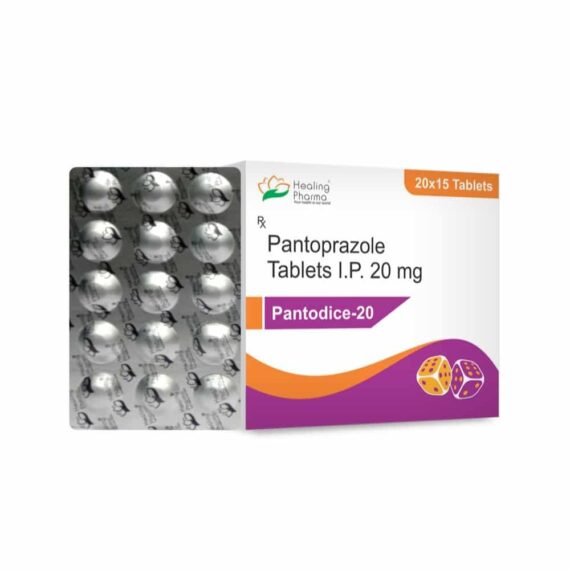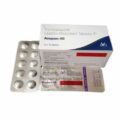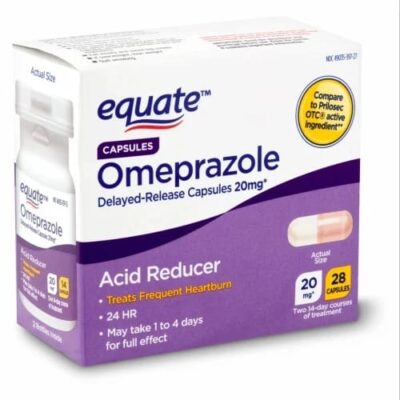Pentaprazole (Protonix) 30 Tablets
$40.00
- Acid Reduction: Pantoprazole works by inhibiting the proton pumps in the stomach lining, thereby reducing the production of stomach acid.
- Ulcer Healing: It helps in healing and preventing ulcers in the stomach and duodenum by reducing the acidity in the digestive system.
Description
Pantoprazole, commonly sold under the brand name Protonix, is a medication belonging to the class of proton pump inhibitors (PPIs) used to treat conditions caused by excess stomach acid, including gastroesophageal reflux disease (GERD), peptic ulcers, and Zollinger-Ellison syndrome.
Key Features:
- Acid Reduction: Pantoprazole works by inhibiting the proton pumps in the stomach lining, thereby reducing the production of stomach acid.
- Ulcer Healing: It helps in healing and preventing ulcers in the stomach and duodenum by reducing the acidity in the digestive system.
- GERD Relief: Pantoprazole provides relief from symptoms of GERD, such as heartburn, acid reflux, and regurgitation, by decreasing the amount of acid that flows back into the esophagus.
Usage Instructions:
- Dosage: The typical dosage for adults is 40 mg once daily, taken preferably before a meal. Your doctor may adjust the dosage based on the severity of your condition.
- Administration: Swallow the tablets whole with a glass of water. Do not crush, chew, or split the tablets, as this may affect their effectiveness.
- Duration of Treatment: Pantoprazole is usually prescribed for short-term use to treat specific conditions. Follow your doctor’s instructions regarding the duration of treatment.
- Consistency: Take Pantoprazole at the same time each day for the best results and to maintain consistent acid suppression.
Precautions:
- Osteoporosis Risk: Long-term use of PPIs like Pantoprazole may increase the risk of osteoporosis-related fractures, particularly in older adults or those with other risk factors for bone loss.
- Kidney Disease: Use Pantoprazole with caution in individuals with kidney problems, as dosage adjustments may be necessary.
- Clostridium difficile Infection: Prolonged use of PPIs may increase the risk of developing Clostridium difficile infection, a severe gastrointestinal infection. Inform your doctor if you experience persistent diarrhea while taking Pantoprazole.
- Interactions: Pantoprazole may interact with certain medications, including antiretroviral drugs, antifungal agents, and blood thinners. Inform your doctor about all the medications you are taking to avoid potential interactions.
Side Effects: Common side effects of Pantoprazole may include:
- Headache: Some individuals may experience headaches while taking Pantoprazole.
- Nausea: Nausea or vomiting may occur, especially during the initial stages of treatment.
- Abdominal Pain: Abdominal discomfort or pain is a possible side effect, although it is usually mild and transient.
- Diarrhea or Constipation: Changes in bowel habits, such as diarrhea or constipation, may occur.
Less common but potentially serious side effects may include:
- Allergic Reactions: Seek medical attention if you develop signs of an allergic reaction, such as rash, itching, swelling, severe dizziness, or difficulty breathing, after taking Pantoprazole.
- Vitamin B12 Deficiency: Long-term use of PPIs may lead to vitamin B12 deficiency, particularly in individuals with malabsorption disorders or poor dietary intake of vitamin B12.
- Bone Fractures: Prolonged use of Pantoprazole may increase the risk of bone fractures, especially in older adults or those with other risk factors for osteoporosis.
It’s important to use Pantoprazole as directed by your healthcare provider and to report any concerning symptoms or side effects promptly. Do not exceed the recommended dosage or duration of use without medical supervision.
Additional information
| Strength |
|---|
Only logged in customers who have purchased this product may leave a review.










Reviews
There are no reviews yet.